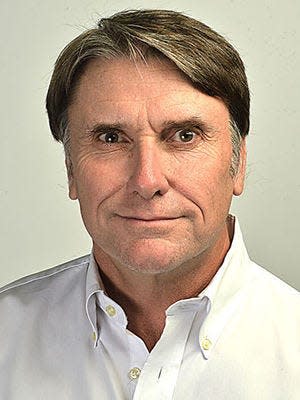Biden made Putin wince; hopefully he meant what he said
- Oops!Something went wrong.Please try again later.
An ex-spy to the core of his icy blue eyes, if you stuck a needle in his thigh down to the bone, it is assumed Vladimir Putin would not so much as blink. Yet he cut loose with an uncharacteristic squeal last week when President Biden said he was prepared to go after Putin’s personal assets should Russia invade Ukraine.
By the end of the day, Putin was back under control, the stony poker player showing no trace of emotion. But American diplomats certainly noticed the “tell.”
Putin’s spokesman was quick to say that such a move would be highly “destructive” to U.S.-Russian relations, and Americans with such designs were wasting their time because Putin doesn’t have any overseas assets.
Kremlin spokesman Dmitry Peskov said it has "long been prohibited for representatives of senior leadership and officials" to hold foreign assets. "Therefore, of course, such a formulation of the question is absolutely not painful for any one of the representatives of the top management."

He went on to sniff that American politicians “who are not entirely familiar with this topic," should defer to "those who are professionally engaged in Russia."
Um hm. Now I’m just an old country journalist, but to me this sounds a lot like, “Putin doesn’t have any overseas assets to seize — and if you do seize them, you’ll be in real trouble.”
But OK, for sake of argument, let’s say Putin doesn’t have any foreign assets — you can bet that his oligarch cronies do, and they would be very displeased if these funds were jeopardized.
More from Tim Rowland: Biden has succeeded at not being Trump
Bad education: Politician ready to fix curriculum with incorrect history
Russia’s wealthy cannot invest all their money in Russia, for the simple reason that there is not enough to invest in. You could multiply Russia’s GDP by 10 and it still wouldn’t be within $5 trillion of America’s. We produce a quarter of the world’s GDP; Russia produces 1.95%.
As massive as it is, Russia’s productivity trails nations such as Canada, Italy and Brazil. Its most valuable asset is not based in technology, medicine, industry or even petroleum — it’s trees. So what we are witnessing on the Russian-Ukrainian border is nothing more than the manifestation of a titanic inferiority complex.
We are told Putin is unpredictable, when in fact he is as predictable as a child whose brother is getting all the attention. For years now the world has treated Putin’s Russia like the afterthought he has made it into. Rather than lifting up his people he has lifted up himself and a few dozen of his closest and richest friends.
Now he is paying the price. By failing to spread around the wealth, by failing to invest, by failing to diversify beyond petroleum and weapons, he has relegated his nation to the back bench of world economies.
How it must steam Putin to see the U.S. and China clash angrily over intellectual property, monetary policy, markets and natural resources. No American president is starting a trade war with Russia, because Russia doesn’t have anything Americans want.
Feeling left out and ignored, Putin was bound to do something beyond his petty-thief equivalent of computer hacking and stirring up Americans on Facebook.
By invading Ukraine, Putin would hope to, one, take his people’s minds off of the miserable conditions he has created for them and, two, try to convince the world that he matters. If you seek parallels, look no further than North Korea, where little whatshisname, jealous of all the attention Russia is currently winning, began firing off a bunch of missiles over this past week. You wonder if Putin has enough self-awareness to see the similarities.
Unlike North Korea, Russia does have meaningful amounts of oil and gas to use as leverage — except that when petroleum is all you have to sell, cutting off supply to Europe is like drinking poison and hoping your enemy dies. Already, suppliers of liquified natural gas, including the U.S., seem to have enough capacity to compensate for any spigot Russia chooses to close.
Long term, of course, fossil fuels are not a growth industry. Renewables are increasing exponentially, and it won’t be long before Russia’s last card has been played.
The danger to the world is that Putin has gotten himself into a fix that he can’t get out of without an untenable loss of dignity. That’s what makes him dangerous. The difference between war and peace may depend on diplomats’ skill in providing Putin with a “concession,” however meaningless, with which he can make a case to the people and the world that he has won the staredown.
The other hope is that there’s something out there Putin values more than dignity, namely money. Last week Joe Biden made Vladimir Putin wince. Let’s hope the president meant it. If there were ever a time to play hardball, this would be it.
Tim Rowland is a Herald-Mail columnist.
This article originally appeared on The Herald-Mail: Putin as predictable as a child whose brother is getting the attention
